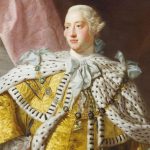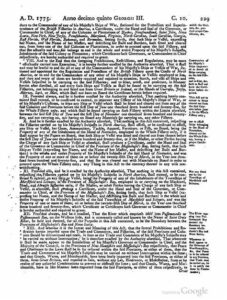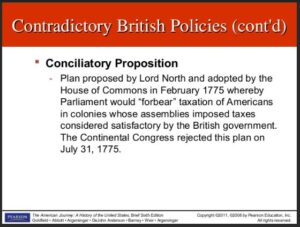 If King George III was hoping to keep the New England colonies dependent on the British by placing taxes, restrictions, lockdowns, and the New England Restraining Act on them, he greatly underestimated the colonists. The New England Restraining Act was endorsed by King George III on March 30, 1775. The Act required New England colonies to trade exclusively with Great Britain as of July 1, 1775, with an additional rule going into effect on July 20, banning colonists from fishing in the North Atlantic.
If King George III was hoping to keep the New England colonies dependent on the British by placing taxes, restrictions, lockdowns, and the New England Restraining Act on them, he greatly underestimated the colonists. The New England Restraining Act was endorsed by King George III on March 30, 1775. The Act required New England colonies to trade exclusively with Great Britain as of July 1, 1775, with an additional rule going into effect on July 20, banning colonists from fishing in the North Atlantic.
The Restraining Act and the Conciliatory Proposition were introduced to Parliament by British prime minister, Frederick, Lord North, on the same day. The Conciliatory Proposition promised that no colony that met its share of imperial defenses and paid royal officials’ salaries of their own accord would be taxed…a ridiculous statement, because the very act of making the forced payments was basically taxing. Supposedly, the British were  conceding to the colonists’ demand that they be “allowed to provide the crown with needed funds on a voluntary basis.” Through the preposition, Parliament would ask for money through requisitions, not demand it through taxes. If you ask me, that is a distinction without a difference. Either way, the colonists were forced to pay for things they shouldn’t have to. The Restraining Act was meant to appease Parliamentary hardliners, who would otherwise have impeded passage of the pacifying proposition. So, Lord North had to work both sides against the middle to get the Conciliatory Proposition passed.
conceding to the colonists’ demand that they be “allowed to provide the crown with needed funds on a voluntary basis.” Through the preposition, Parliament would ask for money through requisitions, not demand it through taxes. If you ask me, that is a distinction without a difference. Either way, the colonists were forced to pay for things they shouldn’t have to. The Restraining Act was meant to appease Parliamentary hardliners, who would otherwise have impeded passage of the pacifying proposition. So, Lord North had to work both sides against the middle to get the Conciliatory Proposition passed.
Unfortunately for North and prospects for peace, General Thomas Gage had already received orders from London to march on Concord, Massachusetts. His orders were to destroy the armaments stockpiled in the town and take Patriot leaders John Hancock and Samuel Adams into custody. Gage had received the orders in January 1775 and arrived in Boston before the Conciliatory Proposition, meaning that he didn’t know about the  agreement made to stop the taxing of the colonists. So, on April 18, 1775, an army of 700 Redcoats marched towards Concord Bridge. It was basically the last straw…the military action that would lead to the Revolutionary War, the birth of the United States as a new nation, the temporary downfall of Lord North, and the near abdication of King George III. The Treaty of Paris marked the end of the conflict and guaranteed New Englanders the right to fish off Newfoundland. It was the very right denied them by the New England Restraining Act. The British learned that they could only push the colonists so far, and then they would lose control of the very people they tried to enslave.
agreement made to stop the taxing of the colonists. So, on April 18, 1775, an army of 700 Redcoats marched towards Concord Bridge. It was basically the last straw…the military action that would lead to the Revolutionary War, the birth of the United States as a new nation, the temporary downfall of Lord North, and the near abdication of King George III. The Treaty of Paris marked the end of the conflict and guaranteed New Englanders the right to fish off Newfoundland. It was the very right denied them by the New England Restraining Act. The British learned that they could only push the colonists so far, and then they would lose control of the very people they tried to enslave.


Leave a Reply